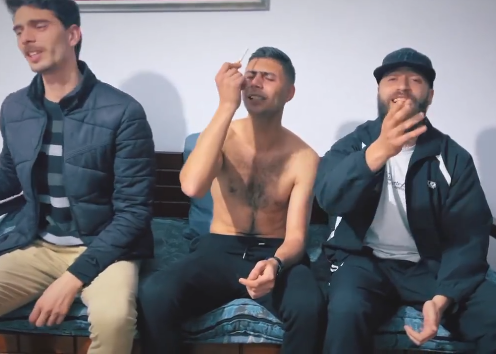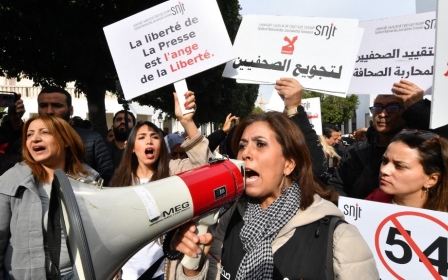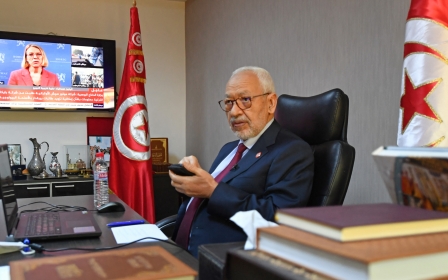'We were just singing': Tunisian students stunned after satirical song imprisonment

Last weekend, three young Tunisians used the theme tune of a famous children's show to make a satirical song.
They released the track, which criticised police behaviour and the criminalisation of cannabis in Tunisia, on the internet.
They did not think much of it. They certainly didn't think that what they described in the song would then happen to them just a few days later.
Using the opening theme song of Babar the Elephant, the young men sing about the police breaking into a home and wrongly accusing those present of smoking cannabis. The cops take them to the station and lock them up for a few days.
The song also pokes fun at how easily corruptible the police force is, denouncing both police brutality and the Draconian punishments meted out for smoking cannabis in Tunisia, where drug offences represent a third of the country's prison population.
New MEE newsletter: Jerusalem Dispatch
Sign up to get the latest insights and analysis on Israel-Palestine, alongside Turkey Unpacked and other MEE newsletters
Within the next few hours, the song went viral, reaching 1.7 million views on Tiktok and receiving hundreds of thousands of likes.
But the song's fictionalised tale of police heavy-handedness would soon become all too real.
Three days later, Youssef Chelbi and Dhia Nsir, respectively 27 and 26-years-old, were arrested on their way to a friend's house and accused of "insulting others through communication networks" and "attributing incorrect claims to a public official".
Chelbi, a student from Nabeul, in northeastern Tunisia, said he felt extremely confused and was not able to reach his family.
"From 7am to 11pm, [the policemen] did not let me contact my family, who had no idea where I was. I also asked for a lawyer and they said no. What I sang about is what happened to me exactly," he said, in a statement to local media.
He said he expected to be fined at most, and was shocked to hear of prison charges. "I felt like a terrorist, a criminal, after the prison sentence. The last thing I expected was to be put in jail for this."
The two students face charges that could lead to up to four years in prison.
@ahmed.ben.romdhane 😂💥مرة في حينا زارنا الحاكم في الليل #track #viral #tiktoklongs ♬ son original - Ahmed Ben romdhane
Waves of support spread throughout social media, with hashtags such as #FreeBabar calling for the release of the two students. Pictures of the cartoon elephant behind bars were also shared to protest against a potential imprisonment seen as unjust.
A different version of the song was also created to denounce decree-law 54, the new cybercrime law published by President Kais Saied in September 2022, which has been used several times to target his opponents.
A couple of days after the arrests, lawyers submitted a demand for release that was refused.
The next day, on May 19, right before going to the Arab League Summit, Saied expressed his surprise at such an arrest.
"There is no justification for arresting students who are on the verge of passing exams. This is unacceptable," he said, while insisting on the need for judges to serve justice independently and impartially.
A few hours following the president's statement, the two students were released to await their trial next Tuesday.
"I didn't insult or hurt anyone. We were just singing," said Chelbi, who said he did not feel remorseful for his actions.
"I want to thank everyone that supported me. Without this public reaction, I would still be imprisoned. I am also thinking of all the other people who were unjustly imprisoned but that no one heard about. What happens to them?"
Lawyer Imen Souissi told local media there was a need to not repeat these violations. "This trial is about much more than Youssef and Dhia. This is about freedom of speech, freedom of thought, the freedom to criticise oppressive systems."
The Tunisian League of Human Rights the arrests were completely arbitrary and jeopardised freedom of speech, an essential gain from the 2011 revolution that toppled longtime ruler Zine el Abidine Ben Ali.
The organisation called for the immediate dropping of all charges against the two students and announced a sit-in protest in front of the tribunal where the audience will be held next Tuesday.
A fearful climate
The decision to arrest the two students probably came from an overzealous investigator, within a general climate of police impunity, according to Souissi. "Decree 54 is weighing down on freedom of speech. The current climate is fearful," she said.
Through statements in local media, the police tried to absolve themselves of responsibility for the incident, insisting that an investigation will be conducted to find out who was responsible for the arrest.
Meanwhile, journalists Haythem Mekki and Elyes Gharbi are both being prosecuted for calling for reform of the police.
According to the NGO I-Watch, 70 percent of police brutality cases registered since 2011 have happened since Saied became president in 2019.
About 30 political prisoners remain jailed in Tunisia, while civil liberties have been curtailed in the wake of the later 2021 power grab by Saied.
Earlier this week, a high school professor was prosecuted and is facing a year in prison for criticising the president on his Facebook page.
"This isn't the first or last case that threatens freedom of speech," said Houssem Boujarra, secretary-general of the Tunisian General Student Union, speaking to local media.
"It needs to raise an alarm bell."
Middle East Eye delivers independent and unrivalled coverage and analysis of the Middle East, North Africa and beyond. To learn more about republishing this content and the associated fees, please fill out this form. More about MEE can be found here.





